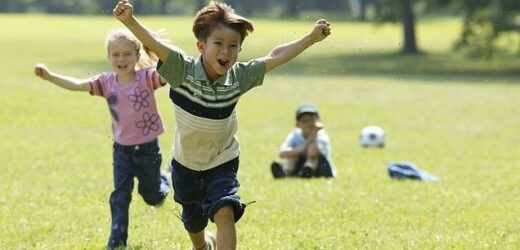Children who move closer to parks or green spaces are more likely to have better lung function, study claims
- A study claims children living near green spaces have better lung function
- Researchers said their findings support creating more parks in cities and towns
- Some 3,278 children living in the Portuguese city of Porto took part in the study
- Its conclusions have now been published in the European Respiratory Journal
Children who move closer to green spaces are more likely to have better lung function than those who live further away, according to a study.
Researchers said their findings support the idea of families moving to greener areas but also highlight the need to create more green spaces in cities and towns.
Some 3,278 children living in the Portuguese city of Porto took part in the study.
Researchers examined the nearest green spaces to children when they were born and again when they were aged four, seven and ten.
Children also performed a lung function test called a forced vital capacity assessment which measures respiratory health by showing the maximum amount of air a person can blow out after taking in the deepest possible breath.
Children who move closer to green spaces are more likely to have better lung function than those who live further away, according to a study
The study, published in the European Respiratory Journal, found children whose home surroundings became ‘greener’ between birth and their 10th birthday, either due to house moves or due to environmental changes, had better lung function.
The authors said that while the mechanism behind the finding is ‘still unknown’, their study suggests that ‘city greening may improve children’s respiratory health’.
Lead author Dr Diogo Queiroz Almeida, from the University of Porto, said: ‘Our research suggests the greener, the better.
‘These improvements are modest at around 2 per cent. However, if we look at the whole population, making our neighbourhoods greener could have a considerable impact.
‘We looked at factors like physical activity and air pollution, but the link between lung function and moving closer to green space remained, even after we took these into account.
‘It could also be that getting closer to nature reduces stress, which can improve physical health, or it might have a positive effect on children’s microbiome – the community of different bacteria that live in our bodies.
‘We found that living in greener neighbourhoods as children grow up is more important for their breathing than living in a green area when they were born. This may be because babies spend much less time outdoors than children.’
He added: ‘To reduce health inequalities, we need to make our cities greener, especially in areas where there is little or no green space.’
Source: Read Full Article



